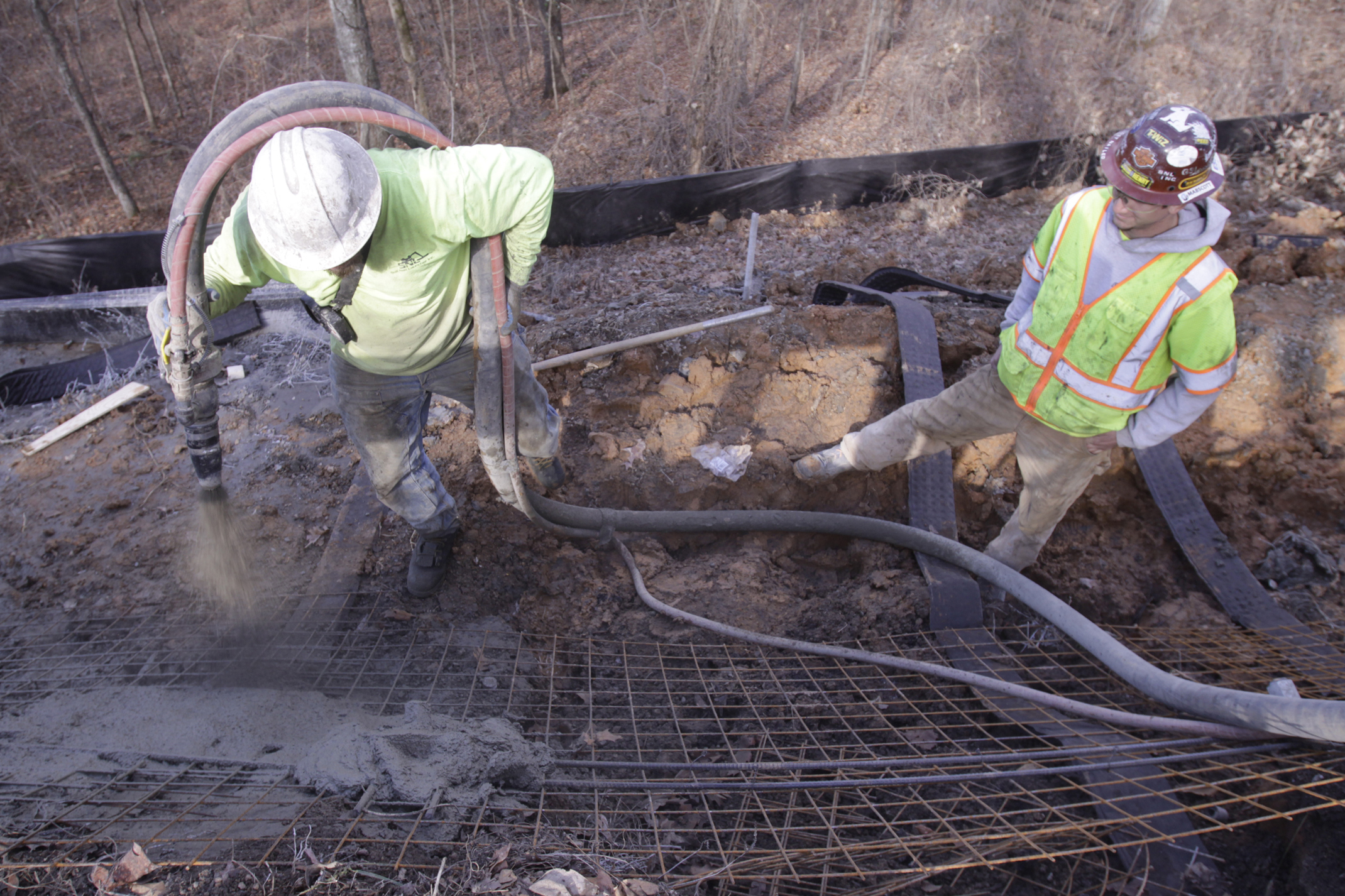 Workers Josh Kelly, left, and Rouse Slape spray concrete onto the side of Lookout Mountain near Fort Payne, Ala., along state Highway 35 on Wednesday. The concrete, called "shotcrete," covers the soil nails that are being drilled into the mountain to stabilize the roadway. The project, which closes one lane of traffic, will use about 37,000 linear feet of nails.
Workers Josh Kelly, left, and Rouse Slape spray concrete onto the side of Lookout Mountain near Fort Payne, Ala., along state Highway 35 on Wednesday. The concrete, called "shotcrete," covers the soil nails that are being drilled into the mountain to stabilize the roadway. The project, which closes one lane of traffic, will use about 37,000 linear feet of nails.FORT PAYNE, Ala. - With million-dollar gigs around the country, nights spent away from home in motel rooms and 142 airline flights logged so far this year, Nate Beard lives a rock-star lifestyle.
Or "soil star" may be more accurate.
Beard is a senior engineer with Soil Nail Launcher Inc., a Colorado-based contracting firm that specializes in stabilizing active roadway landslides.
He's been in Fort Payne since Dec. 10, helping nail down four slow-motion landslides downhill from a milelong stretch of Alabama Highway 35 on Lookout Mountain.
The company's crews are inserting some 37,000 feet of soil nails -- or 1.5-inch-diameter hollow steel rods -- into slumping spots below the highway. Workers bolt a web of steel onto the nails and spray concrete over it to build retaining walls designed to last at least 100 years.
The technique is faster and less expensive than digging up a landslide and filling it in with riprap, Bear said.
"We're able to do this entire project without uprooting one tree," he said. "It's the most eco-friendly approach."
This is Soil Nail Launcher's first job in Alabama.
The Alabama Department of Transportation is spending $2.8 million for the work to stabilize the stretch, which has been sagging for years.
"It's just a continuous maintenance problem," said Johnny Harris, Alabama Department of Transportation division engineer for the state's nine northeastern counties.
The highway cracks as the hillside slumps. So much asphalt has been slathered on that, in spots, the highway has risen relative to the guardrail, making it knee-high.
Inclinometers and piezometers -- devices that measure a landslide's speed -- have shown quite a bit of movement in the last year, Harris said.
"We knew it was just a matter of time before we had a catastrophic failure," he said.
Drilling down
On some projects, Soil Nail Launcher crews use the company's namesake piece of equipment: a compressed air cannon mounted on an excavator, a long-armed piece of heavy machinery that rides metal caterpillar tracks like those on a tank or bulldozer.
Originally developed by the British military to launch chemical weapons, the nail launcher blasts metal rods into the earth at 220 miles per hour.
"The launcher's fun to watch, certainly," Beard said. "It brings a crowd, and you get a lot done really quick."
But it's best for soils with very little rock. The rock-filled clays in Fort Payne could bend rods shot in at high velocity.
So crews are using the company's custom-built drilling rigs mounted on excavators to drive the soil nails -- 10-foot lengths of threaded steel rod.
Workers put a drill bit on the leading end of a rod. As it goes in, additional lengths of steel are coupled on as needed. Nails up to 60 feet in length are being used in Fort Payne.
A slurry of grout is pumped through the hollow rod to cement it into the bedrock, drill bit and all.
Once rods are planted, workers lay down a web of steel mesh and rebar on the hillside, bolt it to the threads of the protruding rods, and cover everything with shotcrete, or sprayed-on concrete, to build a retaining wall.
The work is done in patches, because doing it all at once would undermine the road.
Despite losing construction time to rain, the slope stabilization already was half complete Wednesday.
Traffic is reduced to one lane during the daytime, but that's better than entirely closing the road, said Reid Bailey, another Soil Nail Launcher senior engineer working in Fort Payne.
"We are able to have one lane open," Bailey said. "A lot of other solutions would have required shutting the road down."
Soil Nail Launcher has hired Fort Payne subcontractors Kirkpatrick Concrete and Jackson Paving to assist with the Highway 35 project.
The Colorado company is guaranteeing its work for five years with a performance bond, which is an unusual step for a contractor to take, Harris said.
He's hopeful the technique lives up to its promise. Alabama transportation officials will monitor the repair job closely.
"We'll see," Harris said. "As the old saying goes, the proof of the pudding is in the tasting."
